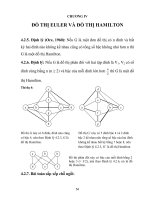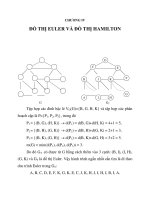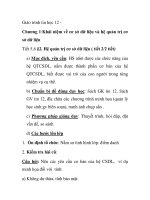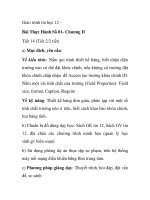Giáo trình tin học chương IV
Bạn đang xem bản rút gọn của tài liệu. Xem và tải ngay bản đầy đủ của tài liệu tại đây (169.32 KB, 33 trang )
2003 Prentice Hall, Inc. All rights reserved.
1
Chapter 4 - Arrays
Outline
4.1 Introduction
4.2 Arrays
4.3 Declaring Arrays
4.4 Examples Using Arrays
4.5 Passing Arrays to Functions
4.6 Sorting Arrays
4.7 Searching Arrays: Linear Search and Binary Search
4.8 Multiple-Subscripted Arrays
2003 Prentice Hall, Inc. All rights reserved.
2
Arrays
• Array
– Structures of related data items
– Static entity (same size throughout program)
– Consecutive group of memory locations
– Same name and type (int, char, etc.)
• To refer to an element
– Specify array name and position number (index)
– Format: arrayname[ position number ]
– First element at position 0
• N-element array c
c[ 0 ], c[ 1 ] … c[ n - 1 ]
– Nth element as position N-1
2003 Prentice Hall, Inc. All rights reserved.
3
Arrays
• Array elements like other variables
– Assignment, printing for an integer array c
c[ 0 ] = 3;
cout << c[ 0 ];
• Can perform operations inside subscript
c[ 5 – 2 ] same as c[3]
2003 Prentice Hall, Inc. All rights reserved.
4
Declaring Arrays
• When declaring arrays, specify
–Name
– Type of array
• Any data type
– Number of elements
type arrayName[ arraySize ];
int c[ 10 ]; // array of 10 integers
float d[ 3284 ]; // array of 3284 floats
• Declaring multiple arrays of same type
– Use comma separated list, like regular variables
int b[ 100 ], x[ 27 ];
2003 Prentice Hall, Inc. All rights reserved.
5
Examples Using Arrays
• Initializing arrays
– For loop
• Set each element
– Initializer list
• Specify each element when array declared
int n[ 5 ] = { 1, 2, 3, 4, 5 };
• If not enough initializers, rightmost elements 0
• If too many syntax error
– If array size omitted, initializers determine size
int n[] = { 1, 2, 3, 4, 5 };
• 5 initializers, therefore 5 element array
2003 Prentice Hall, Inc.
All rights reserved.
6
3 #include <iostream>
5 using std::cout;
6 using std::endl;
8 #include <iomanip>
10 using std::setw;
12 int main()
13 {
14 int n[ 10 ]; // n is an array of 10 integers
16 // initialize elements of array n to 0
17 for ( int i = 0; i < 10; i++ )
18 n[ i ] = 0; // set element at location i to 0
20 cout << "Element" << setw( 13 ) << "Value" << endl;
22 // output contents of array n in tabular format
23 for ( int j = 0; j < 10; j++ )
24 cout << setw( 7 ) << j << setw( 13 ) << n[ j ] << endl;
26 return 0; // indicates successful termination
27
28 } // end main
2003 Prentice Hall, Inc.
All rights reserved.
7
1 // Fig. 4.4: fig04_04.cpp
2 // Initializing an array with a declaration.
3 #include <iostream>
5 using std::cout;
6 using std::endl;
8 #include <iomanip>
10 using std::setw;
12 int main()
13 {
14 // use initializer list to initialize array n
15 int n[ 10 ] = { 32, 27, 64, 18, 95, 14, 90, 70, 60, 37 };
17 cout << "Element" << setw( 13 ) << "Value" << endl;
19 // output contents of array n in tabular format
20 for ( int i = 0; i < 10; i++ )
21 cout << setw( 7 ) << i << setw( 13 ) << n[ i ] << endl;
23 return 0; // indicates successful termination
25 } // end main
2003 Prentice Hall, Inc. All rights reserved.
8
Examples Using Arrays
• Strings (more in ch. 5)
– Arrays of characters
– All strings end with null ('\0')
–Examples
• char string1[] = "hello";
– Null character implicitly added
– string1 has 6 elements
• char string1[] = { 'h', 'e', 'l', 'l',
'o', '\0’ };
– Subscripting is the same
String1[ 0 ] is 'h'
string1[ 2 ] is 'l'
2003 Prentice Hall, Inc. All rights reserved.
9
Examples Using Arrays
• Input from keyboard
char string2[ 10 ];
cin >> string2;
– Puts user input in string
• Stops at first whitespace character
• Adds null character
– If too much text entered, data written beyond array
• We want to avoid this (section 5.12 explains how)
• Printing strings
– cout << string2 << endl;
• Does not work for other array types
– Characters printed until null found
2003 Prentice Hall, Inc.
All rights reserved.
10
3 #include <iostream>
5 using std::cout;
6 using std::cin;
7 using std::endl;
9 int main() {
11 char string1[ 20 ], // reserves 20 characters
12 char string2[] = "string literal"; // reserves 15 characters
14 // read string from user into array string2
15 cout << "Enter the string \"hello there\": ";
16 cin >> string1; // reads "hello" [space terminates input]
18 // output strings
19 cout << "string1 is: " << string1
20 << "\nstring2 is: " << string2;
22 cout << "\nstring1 with spaces between characters is:\n";
24 // output characters until null character is reached
25 for ( int i = 0; string1[ i ] != '\0'; i++ )
26 cout << string1[ i ] << ' ';
28 cin >> string1; // reads "there"
29 cout << "\nstring1 is: " << string1 << endl;
31 return 0; // indicates successful termination
33 } // end main
2003 Prentice Hall, Inc.
All rights reserved.
11
Enter the string "hello there": hello there
string1 is: hello
string2 is: string literal
string1 with spaces between characters is:
h e l l o
string1 is: there
2003 Prentice Hall, Inc. All rights reserved.
12
Passing Arrays to Functions
• Specify name without brackets
– To pass array myArray to myFunction
int myArray[ 24 ];
myFunction( myArray, 24 );
– Array size usually passed, but not required
• Useful to iterate over all elements
• Arrays passed-by-reference
– Functions can modify original array data
• Individual array elements passed-by-value
– Like regular variables
– square( myArray[3] );
2003 Prentice Hall, Inc. All rights reserved.
13
Passing Arrays to Functions
• Functions taking arrays
– Function prototype
• void modifyArray( int b[], int arraySize );
• void modifyArray( int [], int );
– Names optional in prototype
• Both take an integer array and a single integer
– No need for array size between brackets
• Ignored by compiler
– If declare array parameter as const
• Cannot be modified
• void doNotModify( const int [] );









